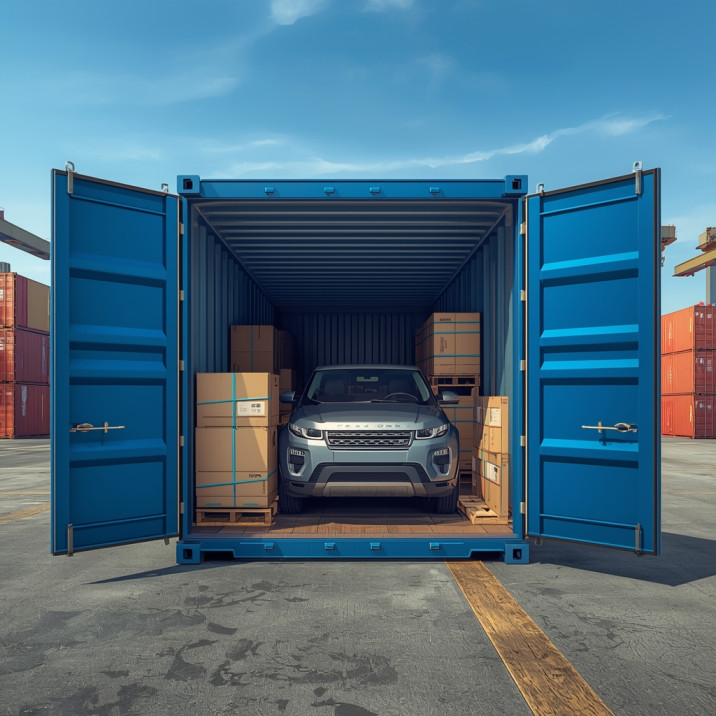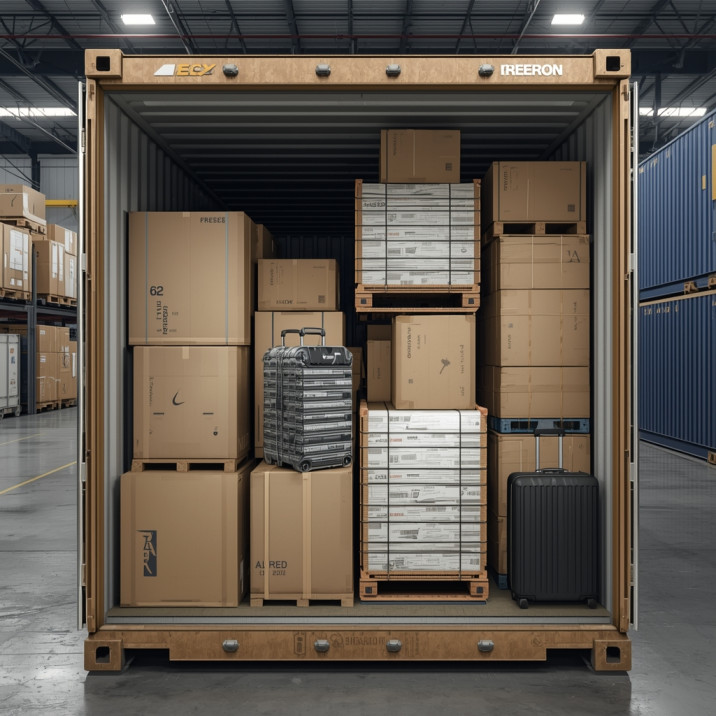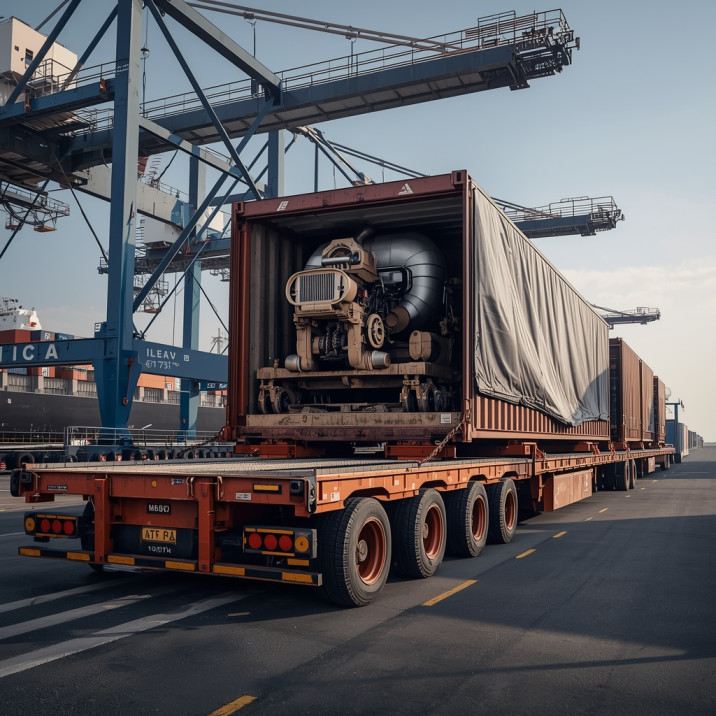If you searched “ship a container to France,” USA to France Container Shipping, or just need to get Ocean Freight to France or just need to get Overall International Container Shipping France information, you’re in the right place.
This guide explains how container shipping from the USA to France works, including service options, container types, cargo compatibility, transit times, costs, and documentation requirements.
In general, container shipping is one of the most flexible and widely used methods for exporting cargo to France. Specifically, it supports personal shipments, commercial exports, vehicles, boats, palletized freight, machinery, and oversized cargo, with multiple loading and handling options available.
Meanwhile, All Transport Depot Inc. operates as a licensed and bonded FMC NVOCC (#021693) and coordinates container shipments from anywhere in the USA to major ports in France through established global ocean carriers.
🚢 Ship with Confidence. Partner with world-renowned NVOCCs and leading global ocean carriers.
👉 Get a Rate:
https://alltransportdepot.com/roro-shipping-cost/
👉 Place Your Order:
https://alltransportdepot.com/place-order/
📲 WhatsApp: +1 (470) 791-4497
📞 Call: +1 (678) 528-5794
📧 Email: ship@alltransportdepot.com
All TransportDepot Inc.
FMC Licensed & Bonded NVOCC #021693
Get Ocean Freight to France
Container Shipping Services to France
Container shipping services to France are structured to support both private and commercial exporters, while also offering flexibility based on cargo type, loading preference, and location.
🚪 Door-to-Port Shipping
In this case, Door-to-Port shipping includes pickup of cargo from a residential address, business, dealership, or warehouse anywhere in the USA, followed by export handling and ocean transport to France.
Accordingly, this option is commonly used for:
International relocations -Ocean Freight to France
Household goods and personal effects
Boats and vehicles
Commercial exports shipped directly from origin
🏠 Container Delivered to Your Location for Loading (Self-Load Option)
Door-to-Port Container Delivery for Client-Managed Loading
As part of Door-to-Port service, a container may be delivered directly to a residence or business for client-managed loading. In practice, this option is selected by shippers who want direct oversight of packing and loading.
In this scenario:
-
First, an empty container is delivered on a chassis
-
Then, the container remains on the chassis throughout loading
-
Next, the client completes loading
-
Finally, the container is returned to the terminal for export to France
Accordingly, this option is commonly used for:
-
Household goods
-
Furniture
-
Mixed cargo
-
Palletized items
Access & Loading Considerations
-
In addition, appropriate loading equipment must be available where required
-
Likewise, vehicles or machinery typically require ramps, docks, or lifting equipment
-
However, if loading extends beyond the scheduled window, additional charges may apply
-
Furthermore, residential or HOA-managed properties may require advance approval
-
Ultimately, any third-party costs (property access restrictions, extended truck time, or local fees) are passed through to the shipment account
🏢 Warehouse-to-Port Shipping
Warehouse-to-Port service is ideal for shippers who prefer professional handling and loading. In this case, cargo is delivered to a U.S. export warehouse, where containers are loaded, secured, and prepared for ocean transport.
Accordingly, this option is commonly used for:
-
Vehicles
-
Boats and marine equipment
-
Palletized commercial freight
-
Machinery and crated cargo
-
High-value or complex shipments
🔒 Professional Warehouse Loading
Warehouse loading allows trained personnel to handle:
-
Blocking and bracing
-
Weight distribution
-
Cargo separation
-
Compliance with ocean carrier and terminal standards
As a result, this approach reduces risk and is recommended for:
-
Boats
-
Machinery
-
Oversized cargo
-
Mixed loads
📦 Shipper-Owned Containers (SOC)
Shipper-Owned Containers (SOC) may be used provided the equipment meets port and carrier acceptance requirements. In this case, SOC shipments typically include:
-
Trucking
-
Export filing
-
Ocean booking
-
Terminal coordination
SOC containers generally must:
-
Be seaworthy and watertight- Before you buy a container, be sure to ask for the seaworthy and watertight certificate
-
Be neutralized (no shipping-line branding or prefixes)
-
Pass terminal inspection prior to acceptance
However, containers that do not meet acceptance standards may be subject to:
-
Additional handling
-
Repositioning
-
Rebooking charges
What Can Be Shipped in a Container to France?
Container shipping supports nearly all cargo types. In general, if cargo can be safely secured and complies with export regulations, it can typically be shipped by container.
Accordingly, common containerized cargo includes:
-
Vehicles (cars, SUVs, vans, motorcycles)
-
Boats & marine equipment (trailered boats, jet skis, small vessels)
-
Household goods & personal effects
-
Furniture and mixed cargo
-
Palletized freight (commercial or wholesale)
-
Machinery & industrial equipment
-
Construction materials
-
Crated or boxed shipments
-
Oversized and non-standard cargo (open-gauge)
Ultimately, if your cargo fits in — or on — a container, it can typically be shipped to France with the correct equipment and documentation.
All Container Types Available for Shipping to France
Different cargo types require different container configurations. Accordingly, available container options include:
-
20-Foot Standard Containers
-
40-Foot Standard Containers
-
40-Foot High Cube Containers
-
Open-Top Containers
-
Flat Rack Containers
-
Open-Gauge Containers
-
Refrigerated (Reefer) Containers
-
Hazmat-Approved Containers
-
Shipper-Owned Containers (SOC)
In particular, open-top, flat rack, and open-gauge containers are commonly used for boats, machinery, industrial cargo, and oversized freight that exceed standard container dimensions.
How Cargo Is Loaded Into Containers
Loading methods vary based on cargo type, size, and origin location. Accordingly, common methods include:
-
Warehouse loading using forklifts and professional bracing
-
Client-managed loading at a residence or business
-
Crane-assisted loading for boats, machinery, or SOC containers
-
Ramp or dock loading for rolling cargo
-
Palletized loading for boxed or commercial freight
Ultimately, selecting the correct loading method helps ensure port acceptance, cargo safety, and smooth customs processing.
Who Typically Ships Containers to France?
Container shipping to France is commonly used by a wide range of customers. In particular, this includes:
-
Families relocating internationally
-
Auto exporters and dealerships
-
Boat owners and marine businesses
-
Furniture and mixed-cargo shippers
-
Commercial exporters and wholesalers
-
Contractors shipping equipment into the EU
🚢 Ship with Confidence. Partner with world-renowned NVOCCs and leading global ocean carriers.
👉 Get a Rate:
https://alltransportdepot.com/roro-shipping-cost/
👉 Place Your Order:
https://alltransportdepot.com/place-order/
📲 WhatsApp: +1 (470) 791-4497
📞 Call: +1 (678) 528-5794
📧 Email: ship@alltransportdepot.com
All TransportDepot Inc.
FMC Licensed & Bonded NVOCC #021693
Why Ship a Container to France?
France is a key logistics gateway to Southern Europe, supported by modern port infrastructure and efficient customs procedures. Consequently, shipping a container to France provides direct access not only to the Portuguese market but also to the broader European Union. Moreover, its strategic Atlantic location strengthens trade routes between North America and Europe. Therefore, many exporters and private shippers select France as their primary EU entry point.
Accordingly, container shipping to France proves particularly well-suited for:
-
First, international relocations
-
Next, vehicle and boat exports
-
Additionally, commercial and wholesale cargo
-
Likewise, furniture and personal effects
-
Finally, machinery and industrial equipment
Transit Times When Shipping a Container to France
Transit times differ depending on the U.S. port of departure. Generally speaking, estimated ocean transit durations are as follows:
-
East Coast (New York, Savannah): 12–18 days
-
Gulf Coast (New Orleans): 16–22 days
-
West Coast (Long Beach, Oakland): 20–27 days
Nevertheless, transit times can fluctuate due to carrier schedules, port congestion, vessel routing, weather, and seasonal demand. Consequently, early booking and flexible planning are recommended to ensure the best sailings.
Shipping Rates to France (USA → France)
Shipping costs vary by container size and origin port. Typically, estimated rate ranges include:
20-Foot Container, For Example
-
East Coast: $2,700 – $3,800
-
Gulf Coast: $3,000 – $4,000
-
West Coast: $3,400 – $4,500
40-Foot Container, For Example
-
East Coast: $4,200 – $5,600
-
Gulf Coast: $4,400 – $5,800
-
West Coast: $4,800 – $6,400
Still, rates depend on container type, loading port, cargo specifics, and carrier fees.
Main Ports in France for Container Shipping
France boasts a comprehensive and advanced seaport and maritime logistics system that facilitates international container shipping, RoRo vehicle transport, project cargo, heavy machinery freight, bulk goods, breakbulk shipments, and oversized equipment exports. Consequently, choosing the appropriate French destination port is essential for ocean transit time, inland trucking distribution, rail intermodal connections, EU customs clearance, import processing, and last-mile delivery when shipping containers from the USA to France.
Below are the two principal international container ports in France commonly used for U.S.–France ocean freight, full-container-load (FCL) shipments, consolidated cargo, commercial exports, household goods relocations, and vehicle imports.
⚓ Port of Le Havre — Northern France
Ideal for: Containers, vehicles, household goods, commercial cargo, international relocations, RoRo shipments, palletized freight, project cargo, personal effects, import/export shipments
The Port of Le Havre is France’s largest container port and a key maritime gateway, handling container shipping, RoRo operations, vehicle imports, and commercial ocean freight. Situated on the English Channel, it offers direct access to the Paris metropolitan area and northern France, making it a top choice for U.S.–France container shipments, inland distribution, and EU logistics.
Therefore, key benefits include:
-
Extensive container terminal facilities with modern cargo handling equipment
-
Robust road and rail intermodal connections for efficient inland transport
-
Streamlined French customs clearance and port processing
-
Regular ocean sailings from major U.S. container ports
-
Excellent access for trucking throughout northern and central France
Typically, shippers use the Port of Le Havre for:
-
Household goods and personal effects shipments
-
Vehicle and motorcycle imports into France
-
Commercial and palletized export cargo
-
Mixed, consolidated, and full-container-load (FCL) shipments
🔗 Port of Le Havre Authority:
https://www.haropaports.com/en/le-havre-port
⚓ Port of Marseille Fos — Southern France
Ideal for: Containers, vehicles, bulk cargo, industrial freight
The Port of Marseille Fos, serving the Provence-Alpes-Côte d’Azur region, is France’s largest Mediterranean port. Notably, it plays a vital role in handling containerized cargo, vehicles, industrial equipment, and bulk shipments for southern France and neighboring Mediterranean countries. Furthermore, its strategic location enhances inland connectivity across the region.
Accordingly, key advantages include:
-
Firstly, state-of-the-art deep-water container terminals
-
Secondly, high efficiency for industrial and commercial cargo handling
-
Additionally, strong logistics links to southern France and the Mediterranean
-
Moreover, reduced inland transport times for regional destinations
-
Finally, reliable handling of oversized and project cargo
For these reasons, shippers often choose Marseille Fos for:
-
In particular, commercial and wholesale imports
-
Similarly, industrial machinery and equipment
-
Also, vehicles and rolling stock
-
As well, oversized or non-standard container shipments
🔗 Port of Marseille Fos Authority:
https://www.marseille-port.fr/en
Choosing the Right Port in France
When shipping a container to France, generally, the decision between Le Havre and Marseille Fos depends on several important factors. Specifically, these factors include:
-
Firstly, the final delivery destination
-
Secondly, cargo type and size
-
Additionally, inland transportation needs
-
Finally, customs clearance preferences
Ultimately, both ports can accommodate standard, high-cube, open-top, flat rack, and open-gauge containers, depending on shipment requirements.
Customs & Documentation (France – 2026)
When shipping a container to France, customs clearance is a crucial step. Therefore, shippers should prepare all necessary documentation beforehand. Typically, required documents include:
-
Firstly, the Bill of Lading
-
Secondly, a Commercial Invoice and Packing List
-
Additionally, a passport or company registration
-
If applicable, the vehicle title
-
Likewise, the AES Export Declaration (U.S.)
Import Duties & Taxes – International Container Shipping France
Upon arrival in France, customs authorities may levy fees. Consequently, importers should expect the following charges:
-
Primarily, customs duty based on HS codes
-
Additionally, VAT and port handling fees
-
In some cases, extra charges for restricted goods
📞 French Customs (Le Havre): +33 2 35 19 30 00
FAQs – Shipping Containers to France
Can a container be delivered to a home for loading?
Yes. In many cases, Door-to-Port service delivers the container directly to a residence or business for client-managed loading, subject to access and scheduling considerations.
When a container is delivered to my door, will it be placed on the ground or remain on a chassis?
Typically, the driver keeps the container on a chassis during the loading window. Ground placement remains uncommon and may require special equipment, permits, or additional fees.
How long can I keep the container for loading?
In most cases, we schedule a loading window—often 1–3 days—although some locations allow only a short live-load period (such as two hours). Additional time may result in daily charges.
Can boats and vehicles ship in containers?
Yes. In general, we ship boats, vehicles, and marine equipment using standard, open-top, flat rack, or open-gauge containers. Although this may be true Roro is a great alternative.
Do services support oversized cargo?
Yes. Accordingly, we offer open-top, flat rack, and open-gauge container options.
Do I need special equipment to load heavy cargo?
Yes. As a matter of fact, You may need forklifts, ramps, cranes, or docks to load vehicles, boats, or machinery.
Is export documentation handled?
Yes. We typically handle U.S. export filings and coordination together with Ocean Freight to France
What documents are required to ship to France?
Generally, you must provide export filings, commercial invoices, packing lists, vehicle titles (if applicable), and consignee identification. Above all
Generally, this includes export filings, commercial invoices, packing lists, vehicle titles (if applicable), and consignee identification.
Will I need to pay duties or taxes in France? USA to France Container Shipping
Yes. Depending on the shipment and Ocean Freight to France. Portuguese customs may assess import duties, VAT, or clearance fees.
Can customs clearance be arranged in France?
Yes. Additionally, local agents can assist with destination customs processing to help with International Container Shipping France
Is marine insurance available?
Yes. Additionally, we can arrange marine cargo insurance upon request. this is not part of Ocean Freight to France.
Can I track my container during transit? USA to France Container Shipping
Yes. Moreover, we can arrange inland delivery from the port to the final Port destination. All things considered, when considering USA to France Container Shipping
Start Your 2026 Shipment to France- International Container Shipping France
All Transport Depot Inc. All in All actively provides Door-to-Port, Warehouse-to-Port, and SOC container shipping services from anywhere in the USA. From pickup through export documentation and ocean transport, For instance our team manages every shipment with precision, professionalism, and care.
👉Place Your Order:
https://alltransportdepot.com/place-order/
📧 Email: ship@alltransportdepot.com
📞 Call: +1 (678) 528-5794
📲 WhatsApp: +1 (470) 791-4497

Jessica is a dedicated customer service representative at Windy City Car Carriers. Her warm and friendly demeanor puts customers at ease as she guides them through the car shipping process. She takes pride in ensuring a stress-free experience for every client.



